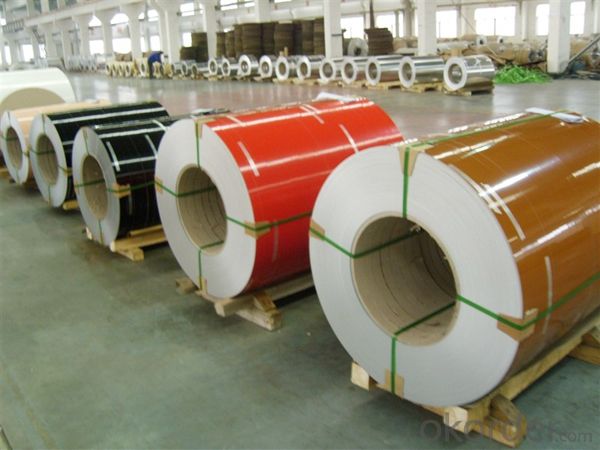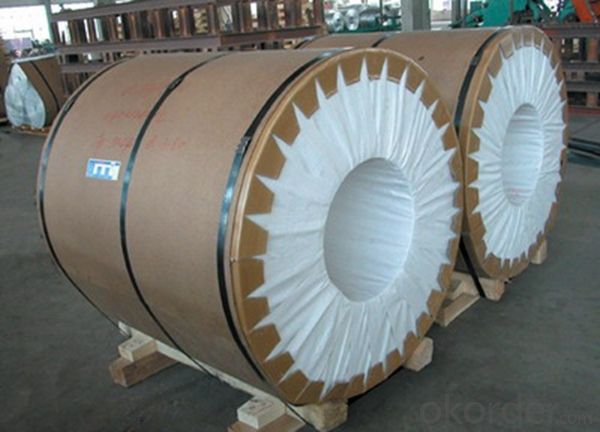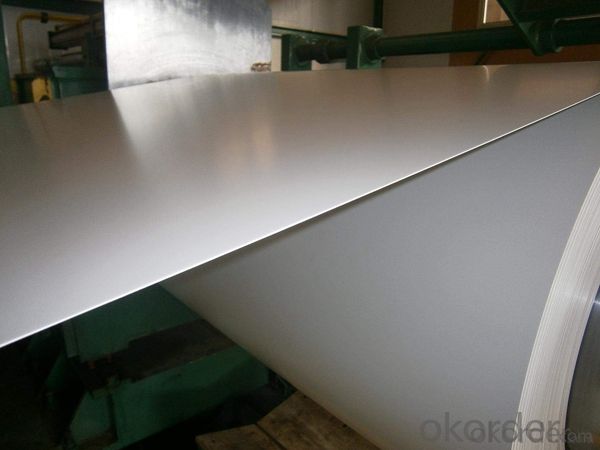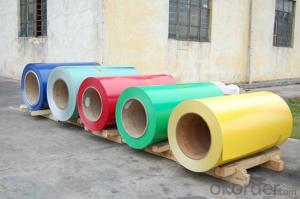Color Coating Aluminium Coil for Curtain Wall Decoration
- Loading Port:
- Shanghai
- Payment Terms:
- TT OR LC
- Min Order Qty:
- 5 m.t.
- Supply Capability:
- 100000 m.t./month
OKorder Service Pledge
OKorder Financial Service
You Might Also Like
Item specifice
1. Specification of Color Coating Aluminium Coil for Curtain Wall Decoration
Name | 3003 Aluminum Coil |
Brand | CNBM |
Alloy | 1100H-18, 3003-H24,3003-H26,3005-H26,8011,3004,3105,5005,etc. |
Thickness | 0.1~1.5mm |
Width | <2000mm |
MOQ | 1 MT |
Coating finish | Brushed, drawing, embossed, printing |
Color | As to code RAL |
Surface | Embossed,Mill Finish,Coated,Brushed |
Gloss | 10-90%(EN ISO-2813:1994) |
Total coating thick | PVDF27 ~35micron |
Polyester18~27micron(EN ISO-2360:1995) | |
Coating hardness | 2H |
Adhesion | 5B (EN ISO-2409:1994) |
Impact resistance | No cracking and peeling (A.S.T.M D2794-1993) |
Flexibility (T-bend) | 0T- 2T |
MEK resistance | 100 |
Certification | ISO9001:2000, CE, SGS |
Coil's standard diameter | 1100mm |
Inner Diameter | 405mm/505mm |
Coil's standard weight | 1MT - 2MT |
2. Application of Color Coating Aluminium Coil for Curtain Wall Decoration
(1).Interior: wall cladding, ceilings, bathrooms, kitchens and balconies, shutters, doors...
(2).Exterior: wall cladding, facades, roofing, canopies, tunnels,column covers , renovations...
(3).Advertisement: display platforms, signboards, fascia, shop fronts...
3. Feature of Color Coating Aluminium Coil for Curtain Wall Decoration
*Such coil is specially designed to replace aluminum ingot, due to the high export tax of aluminum ingot, the coil has better price than ingot.
*This type of coil can fit customer's remelting furnace just like ingot, no need to make any change to the production line that was previously used for ingot. The standard coil size and weight is very suitable for the feed gate of furnace.
*This type of coil causes less material wastage than ingot when remelted.
*Our coil is made directly from ore, no need to go though the ingot making process, quality is much better than other suppliers who use ingot scrap to make coil.
Be free from Oil Stain, Dent, Inclusion, Scratches, Stain, Oxide Dicoloration, Breaks, Corrosion, Roll Marks, Dirt Streaks and other defect which will interfere with use
4. Certificate:
SGS and ROHS(if client request, paid by client), MTC(plant provided), Certificate of Origin(FORM A, FORM E, CO), Bureau Veritas and SGS (if client request, paid by client), CIQS certificate
5. Image of Color Coating Aluminium Coil for Curtain Wall Decoration



6. Package and shipping of Color Coating Aluminium Coil for Curtain Wall Decoration
eye to wall
eye to the wall
with wood pallet (wooded case also available)
7. FAQ
1) What is the delivery time?
Dpends on actual order, around 20 to 35 days
2)What is the QC system:
We have QC staff of 20 persons and advanced equipment, each production is with MTC traced from Aluminum ingot lot.
3) What market do you mainly sell to?
Australia, America, Asia, Middle East, Western Europe, Africa etc
- Q:Are aluminum coils suitable for low-maintenance applications?
- Yes, aluminum coils are suitable for low-maintenance applications. Aluminum is known for its durability and resistance to corrosion, making it an excellent choice for applications that require minimal upkeep. Unlike other materials, such as steel, aluminum coils do not rust or require regular painting to maintain their appearance. Additionally, aluminum is lightweight, which can make installation and handling easier, especially in low-maintenance applications where frequent maintenance may not be feasible or desirable. Overall, aluminum coils offer a reliable and low-maintenance solution for various applications.
- Q:What is the weight of aluminum coils?
- The weight of aluminum coils can vary depending on their size and thickness. Generally, aluminum coils can range from a few hundred pounds to several thousand pounds in weight.
- Q:Classification of aluminium rolls for aluminium rolls
- To spare, so in order to cope with the development of science and technology, in order to contain other aluminum alloy elements, the International Federation of special aluminum strip showed that 9000 series of alternate series, waiting for a new product to fill the gaps of the 9000 series.
- Q:What is the electrical conductivity of aluminum coils?
- The electrical conductivity of aluminum coils is relatively high. Aluminum is known for its good conductivity, with a conductivity rating of approximately 37.7 x 10^6 siemens per meter (S/m). This makes aluminum an excellent choice for various electrical applications, including the manufacturing of coils. The high conductivity of aluminum allows for efficient transmission of electric current through the coils, making them suitable for use in electrical wiring, transformers, motors, and other electrical equipment.
- Q:On Square-D service panels, are the main lugs rated for aluminum wire? Or do I need to use an anti-oxidant compound? What about on Milbank outdoor meter bases?
- Aluminum to Aluminum they say you do not need an inhibitor. I have still aways used it as has every electrical contractor I have worked for for 30 years. Utility companies use it on all meter bases as well. The oxidation can still be persistent so I suggest you use it and torque them to the manufactures labeling. So many people over tighten the conductors and this is a major problem because aluminum is very soft it does have a torque guideline for each conductor size as well as the lug it is attached to. Electrical Contractor ||
- Q:Can aluminum coils be anodized for enhanced durability?
- Yes, aluminum coils can be anodized to enhance their durability. The anodizing process creates an oxide layer on the surface of the aluminum, making it more resistant to corrosion, wear, and abrasion. This improves the overall lifespan and performance of the coils.
- Q:What are the different types of surface treatments for corrosion resistance?
- There are several different types of surface treatments that can be used to enhance corrosion resistance in various materials. These treatments can be categorized into mechanical, chemical, and electrochemical methods. 1. Mechanical surface treatments: These methods involve physically altering or modifying the surface of the material to improve corrosion resistance. Some common mechanical treatments include shot peening, sandblasting, and polishing. Shot peening involves bombarding the material with small metal pellets to induce compressive stresses, which helps to prevent corrosion. Sandblasting is a process of blasting the surface with abrasive particles to remove any existing corrosion and create a clean, smooth surface. Polishing involves the use of abrasives to create a smooth and reflective surface, which reduces the likelihood of corrosion initiation. 2. Chemical surface treatments: Chemical methods involve applying a chemical solution or coating to the material's surface to create a protective layer against corrosion. One commonly used chemical treatment is chromating, which involves the application of a chromate conversion coating. This coating provides a barrier against corrosion and also improves the adhesion of subsequent paint or coating layers. Another chemical treatment is anodizing, commonly used for aluminum surfaces. Anodizing creates a thick oxide layer on the surface, which enhances corrosion resistance and can also provide decorative finishes. Other chemical treatments include phosphating, passivation, and galvanizing, which involve the application of specific chemical solutions or coatings to protect against corrosion. 3. Electrochemical surface treatments: Electrochemical methods utilize the principles of electrochemistry to create a protective layer on the material's surface. One such method is electroplating, which involves the deposition of a thin layer of a more corrosion-resistant material onto the surface of the base material. This can be done using various metals, such as zinc, nickel, or chromium. Another electrochemical treatment is anodic protection, where a sacrificial anode is connected to the material, causing the anode to corrode instead of the material. This process is commonly used for pipelines and underground structures. Overall, the choice of surface treatment for corrosion resistance depends on the material, the intended application, and the desired level of protection. Each treatment method has its advantages and limitations, and it is important to consider factors such as cost, environmental impact, and performance requirements when selecting the appropriate treatment.
- Q:Can aluminum coils be used in the production of aluminum gutters?
- Aluminum gutters can indeed be produced using aluminum coils. In fact, aluminum coils are commonly employed in the manufacturing process of aluminum gutters. These coils are crafted from an aluminum alloy, which happens to be a material that is both lightweight and long-lasting. By utilizing specialized machinery, these coils are expertly molded into the desired gutter profile. The utilization of aluminum coils enables the production of gutters to be efficient and precise, thereby guaranteeing a top-notch final product. Furthermore, aluminum possesses the advantageous quality of being resistant to corrosion, rendering it an ideal material for gutters that will be exposed to various weather elements like rain and snow. All in all, due to their durability, strength, and corrosion resistance, aluminum coils prove to be an excellent choice for the production of aluminum gutters.
- Q:Are aluminum coils easy to bend and shape?
- Yes, aluminum coils are relatively easy to bend and shape. Aluminum is a malleable metal, which means it can be easily deformed under compression without breaking. This property makes it highly suitable for shaping and forming into various shapes and sizes. Additionally, aluminum coils can be manipulated using different techniques such as rolling, bending, or pressing, allowing for a wide range of applications in industries such as construction, automotive, and manufacturing. However, the ease of bending and shaping aluminum coils may also depend on the specific alloy and thickness of the coil. Thicker coils may require more force and specialized equipment for shaping, while certain alloys may have different levels of malleability. Overall, aluminum coils offer a versatile and relatively easy-to-work-with material for bending and shaping purposes.
- Q:... of aluminum atoms?(mole = 6.022x10^23)
- WHEN IM OUT ON THE SEA WITH ME CREW I LIKE TO THINK THAT PERHAPSY WE CAN LOOT A BARGE FULL 'O THAT WONDROUS MATERIAL YE CALL ALUMINUM AS FER MOLES, THEY CAN BE QUITE THE PESTS AROUND YER GARDEN AND WHAT-NOT
1. Manufacturer Overview |
|
|---|---|
| Location | |
| Year Established | |
| Annual Output Value | |
| Main Markets | |
| Company Certifications | |
2. Manufacturer Certificates |
|
|---|---|
| a) Certification Name | |
| Range | |
| Reference | |
| Validity Period | |
3. Manufacturer Capability |
|
|---|---|
| a)Trade Capacity | |
| Nearest Port | |
| Export Percentage | |
| No.of Employees in Trade Department | |
| Language Spoken: | |
| b)Factory Information | |
| Factory Size: | |
| No. of Production Lines | |
| Contract Manufacturing | |
| Product Price Range | |
Send your message to us
Color Coating Aluminium Coil for Curtain Wall Decoration
- Loading Port:
- Shanghai
- Payment Terms:
- TT OR LC
- Min Order Qty:
- 5 m.t.
- Supply Capability:
- 100000 m.t./month
OKorder Service Pledge
OKorder Financial Service
Similar products
New products
Hot products
Related keywords





























